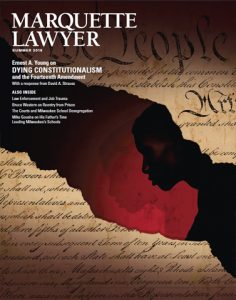 The Summer 2019 issue of Marquette Lawyer features three pairs of stories with an underlying common theme that can be summed up by one of the headlines: “In Search of Better Outcomes.” This issue of the Marquette Law School semiannual magazine overall has a substantial historical orientation, but it also speaks strongly to current realities and issues—as has become even clearer since the magazine hit the streets a few weeks ago. Simply put, learning about the past helps in understanding the present and considering the future. This post takes up one pair of articles: the cover story and a reaction to it.
The Summer 2019 issue of Marquette Lawyer features three pairs of stories with an underlying common theme that can be summed up by one of the headlines: “In Search of Better Outcomes.” This issue of the Marquette Law School semiannual magazine overall has a substantial historical orientation, but it also speaks strongly to current realities and issues—as has become even clearer since the magazine hit the streets a few weeks ago. Simply put, learning about the past helps in understanding the present and considering the future. This post takes up one pair of articles: the cover story and a reaction to it.
The cover story, “Dying Constitutionalism and the Fourteenth Amendment,” is an edited version of the Robert F. Boden Lecture given at Marquette Law School in fall 2018, by Ernest A. Young, the Alston & Bird Professor at Duke Law School. While the Fourteenth Amendment later would be crucial to the growth of constitutional protections and the extension of civil rights—the linchpin of America’s “second founding,” as it is sometimes called—Young focuses on the first 75 years after the amendment was ratified in 1868. It was a period of broad suppression of civil rights, particularly those of African Americans—the Fourteenth Amendment not working much to the contrary.
Young’s purpose is not so much historical as jurisprudential: He presents his essay as a cautionary tale about “living constitutionalism,” demonstrating that, while that mode of constitutional interpretation was not the Court’s stated approach in those 75 years, it could have been: For “every one of [living constitutionalism’s] modalities strongly supported the compromise or even abandonment of the amendment’s core purpose of freedom and equality for black Americans.” Simply stated, the history of the use of the amendment is a reminder that “social progress is not inevitable, that social forces can push constitutional meaning in bad as well as good directions, that living can turn into dying constitutionalism if we are not very, very careful,” Young writes.
In a comment on Young’s lecture, David A. Strauss, Gerald Ratner Distinguished Service Professor of Law at the University of Chicago and author of The Living Constitution (Oxford 2012), says that the early failures under the Fourteenth Amendment need to be reckoned with by those who are proponents of living constitutionalism. He writes that Young’s lecture shows that “in the end, there is only so much that the law can do to save a society from its own moral failings.”
A future post will discuss another pair of articles in the magazine that would support the same reaction. Click here to read both Young’s lecture and Strauss’s comment.
